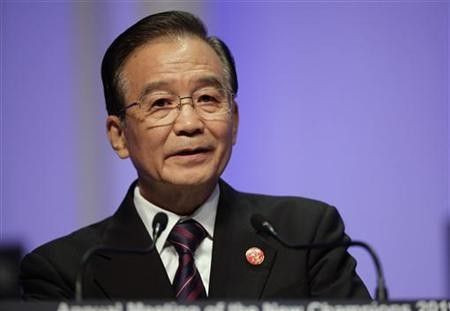China's Wen vows to fight inflation, confident on growth

China will keep monetary policy tight to contain inflation while forging ahead with structural reforms and boosting consumption to sustain long-term economic growth, Premier Wen Jiabao said on Wednesday.
Speaking at the World Economic Forum in the northeastern port city of Dalian, Wen said China's slowing economic growth was a result of the government's tightening measures to bring inflation under control and was within expectations.
He also repeated the calls China has made -- as the biggest overseas holder of U.S. debt -- for Washington to better manage its economy.
We will keep overall price levels basically stable and prevent big swings in economic growth, he said.
The global economic malaise has not affected China's economic fundamentals, Wen said.
China is fully able and we have conditions and confidence in maintaining relatively fast economic growth, he said.
Wen delivered the opening speech at the event, known as summer Davos since the World Economic Forum first began staging the event in China in 2007.
Wen and other Chinese leaders have repeatedly stressed that wrestling inflation remains the top policy priority even though a flurry of measures to tighten monetary conditions have dragged on economic growth.
China's inflation was 6.2 percent in August, easing from a three-year high, although analysts expect it to remain elevated for several months and well above the government's target of 4 percent.
The economy grew by an annual 9.5 percent in the second quarter, slowing from 9.7 percent in the first quarter.
Analysts expect the central bank to hold off further monetary tightening as the global economy slows, though it is still far from easing policy due to fears of growing asset bubbles that could spiral out of control.
China has raised interest rates five times since late last year, and the required reserve ratio nine times.
WILLING TO HELP
With its focus on the developed world's struggles and China's rapid growth, Wen's speech underlined the economic gap between Europe and the U.S. versus China. As Western nations cope with their respective debt crises, China looks likely to grow faster than 9 percent this year.
Wen has been delivering the opening speech at the event, which draws many CEOs and world leaders, since the World Economic Forum first began staging the gathering in China in 2007.
Wen expressed concerns about the global economy amid the worsening debt crisis in Europe and called for greater global confidence and closer cooperation to face the challenges.
Currently, the global economy is slowly recovering, but instability and uncertainty are growing, he said.
Unemployment rates in the major economies continue to be high, and emerging economies face rising inflationary pressures, Wen said.
All this shows that the global economic recovery will take a long time and be arduous and complex.
He expressed confidence in the U.S. economy, urging the country to get its economy house in order.
We believe the U.S. will be able to overcome its difficulties and achieve economic recovery, said Wen.
However, we hope the U.S. will implement sound economic policies and ensure fiscal and financial stability to protect investors' interest and maintain confidence.
Wen also extended a hand to European countries, urging them to recognize China as a market economy, saying the country is willing to invest more in Europe but they in turn need to prevent the debt crisis from spreading.
With about a quarter of China's record foreign currency reserves of $3.2 trillion held in euro assets, Beijing has been unsettled by the risks to the euro, even though Chinese leaders have repeatedly said they believe Europe can conquer its woes.
Meanwhile, central bank adviser Li Dakui, speaking later at Dalian, said China should refrain from buying large amounts of European bonds, adding it was important for European countries to press ahead with reforms.
© Copyright Thomson Reuters 2024. All rights reserved.





















